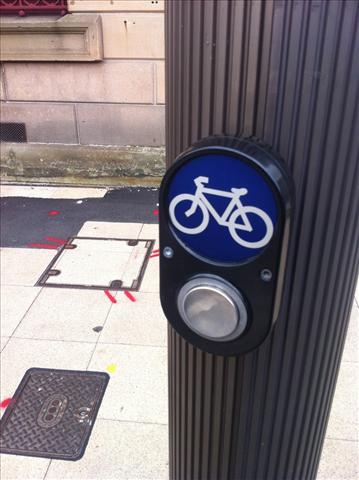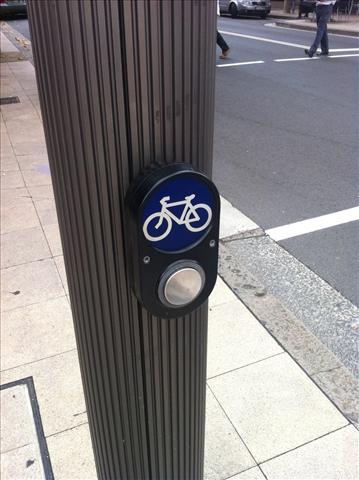I've posted recently on some problems with Sydney's otherwise excellent cycle lane network, well it turns out the subject doesn't really go away. A day after I blogged about the road sensor problem, NSW police staged a crackdown on red-light infractions and non-helmet wearers.
Laying aside the helmet issue for now, it's easy to see, if you've read the previous piece, that there's a problem here. It could well be that the issues with the traffic light sensors have contributed to the light jumping problem, and this, in my opinion, makes any fines issued on crackdown day very doubtful indeed.
So I made a specific effort to go and check out all the light sensors on the Union Street cycleway, part of my commuting route and the section of cycleway which saw the police crackdown last week. Here's what I found. First, citybound:
Harris Street at Union Square

No big deal here, a push button and a light which works reliably. So far so good. Push the button, get a light, usually before the vehicle traffic in the sequence. Good stuff.
Union Street and Pyrmont Street, citybound
Oh lawdy, what is going on here? A tangle of sensor lines almost impossible to decipher. Will the lights trigger? Where am I meant to hit the sensor? Judging by the paint, there used to be a diamond marker down the centre line, so that's presumably where one ought to hit the sensor. It's well away from the ideal stopping point, but there you go.
I have developed the opinion that it's better at this point to cut one's losses and behave as vehicle traffic. I've come to these lights several times at around 10am and had pedestrian traffic, then vehicle traffic, shown a green while my cycle light was left red. There's definitely something wrong.
Union and Edward Streets, citybound
OK, that's not great. Sensor impinged upon by drain cover. Clearly these are not magnetic induction sensors, since the interference of the metal mass to the left would make them worse than useless, right? Right? OK, forget I said anything, I realise where I'm going wrong.
There's also a yawning gap on the left where many, if not most, riders take their stance, but at least the diamond markings are present. Of course, you need to know what the diamonds mean, and how many visitors to Sydney will know that? Indeed, how many regular commuters know? Not many, judging by my own observation.
These sensors seem, anecdotally, to be the least reliable on the strip. Again, I'm tending to join the vehicle lane here rather than use the cycle lanes, because it's just not worth the frustration.
Pyrmont Bridge Road and Murray Street (Pyrmont Bridge Hotel) - citybound
Yawning gap on the left, but look to the right. Yes, this sensor, the one where NSW Police carried out their little sting operation, covers far less than half the width of the cycle lane. Indeed, yesterday morning I observed a rider pull up well to the right of the sensor without impinging on the oncoming lane at all. I alerted him to the existence of the sensor, but had he been riding on the day the police were out, he'd have been left at a red light or been hit with a fine for jumping across when the pedestrians got a green light. Likewise on this morning's bike commute, I saw another rider miss the sensor to the left, and I hit the sensor myself without invading his personal space. We subsequently struck up a conversation which continued all the way across Pyrmont Bridge on the topic of why the cycle lanes are a great idea badly implemented - which was quite informative.
And, you'll notice, there are no diamond markings whatsoever on this sensor, for what good they do.
This is pretty pathetic - three sensors on Union Street citybound, each of which is a failure a different reason, and in the case of at least two, multiple reasons.
So, what about outbound?
Pyrmont Bridge Road and Murray Street (Pyrmont Bridge Hotel) - westbound
Tiny amount of coverage, probably about a quarter of the line-up area, and it sits well to the right of the light pole where most riders place themselves. More than once I've pulled onto this sensor pad next to a rider already standing waiting, oblivious of the sensor. Again, this is the area where the fines were handed out. A rider losing patience with the non-working light would be down $60. This one is pretty bad.
Note also the tactile surfacing, designed to guide visually-impaired pedestrians onto crossing areas. Left in place on a bike lane? This is surely a bad idea? Did no-one notice? One wonders if the RTA is run by a top-hatted freak who keeps a dormouse in his teapot.
Union Street and Edward Street - Westbound
Pretty crappy. Again, yawning gaps to the left and right, less than half the lane covered. Remember from the note above, this is the very unreliable junction. And from the pic, I can't make out where the back edge of the sensor actually is. Poorly installed? Diamond markings present, but probably not for much longer, judging by the fade. Again, I'm getting in with the vehicle traffic these days - it's more reliable.
Union Street and Pyrmont Streets, westbound
This might be the best sensor of the lot, and let it still leaves around half of the lane unmonitored. No visible diamond markings, and I have seen this one fail (most recently last night, 12 Mar 2012 - a confused rider jumped the lights when pedestrians were given a go while the bike light stayed red).
And then the last junction on the strip, Harris Street at Union Square, westbound

Again, a quite reliable button. This one seems to work just fine, but after the debacle that is Union Street, what rider has the patience to wait?
So, we can see from these few examples that the Pyrmont cycle corridor is something of a failure, and yet it was recently target by police against bike riders running red lights. I'll say again: If a light fails to change to green, and you know it should have changed, and you know it's safe to cross, what are you going to do, turn around and go home?
And we don't even know, since the RTA haven't got back to me yet, if these sensors need you to stay in place until your light changes, or if it's sufficient to hit them then move to a more comfortable spot (anecdote says the former), or indeed whether they need full body weight to trigger or if a sub-10kg bike is sufficient to set them off alone. We don't know, though we can try to guess, whether they are magnetic induction or pressure pads, and if they are magnetic induction, whether they'll be triggered differently by, say, a carbon fibre or aluminium-framed bike, rather than a more traditional steel-framed clunker.
All these questions will go to the RTA, once they get round to responding to my enquiries.
[Update: The RTA have responded. You need to stay in place, and the sensors are, it seems, magnetic induction loops]
The real problem, though, in my opinion, is the confusion over and poor enforcement of badly written Australian cycling regulations. In the context of this strip, there's a genuine conflation of cycle traffic with pedestrian traffic - the lights are keyed to the cycle of the pedestrian lights, and the path is segregated away from the road. Cyclists, not unreasonably, infer that they're under pedestrian rules - and pedestrians are permitted to cross when it's safe even if their lights are red. We've all done it. However in the law, cyclists are vehicle traffic, even here.
In the law, adult riders may not ride on the pavement unless accompanying a young rider. How often has anyone been cautioned or fined for ignoring these rules? Anyone? This again reinforces the idea that cycles are more akin to pedestrian traffic than vehicle traffic. The traffic system treats them like pedestrians for the length of the cycleway, and then NSW Police treat them like vehicles when they jump a red light that doesn't work.
This isn't on.
And while we're at it, Pyrmont bridge probably needs a cycle lane, at least on a trial basis - more so than quiet Union Street ever did - and it needs to be policed not only for riders failing to stay inside the lane, but for pedestrians failing to stay out. Pedestrians and cyclists are a potential hazard to each other, and frankly it's only the attentiveness of cyclists that has prevented more injuries on this stretch of shared tarmac. Cyclists do not blunder into the path of pedestrians, but the other way around is tediously common. And I don't even ride this section in peak time, when it is utter chaos. A lane might help, though it may only serve to trammel riders into a restricted area while pedestrians continue to dreamily wander around everywhere, forcing riders to brake rather than maneuver - generally speaking a more dangerous course of action. Only a trial will tell us for sure.
I'm sorry to harp on about it, but this is the way it is. Clover Moore and the City of Sydney's noble and well-intentioned aim to make Sydney a cycling city is going to fail as long as the law, and the infrastructure, fails to recognise that cycle traffic is neither pedestrian nor vehicle. It is unique and needs to be regulated with an understanding of its unique demands. Sometimes, it is entirely safe for a cyclist to cross a junction as though one were a pedestrian. Sometimes it is terribly unsafe, to both cyclist and traffic. Sometimes it is fine for pedestrian and cycle traffic to co-exist in a laissez faire manner, sometimes it is not. Sometimes, despite the fact there's a bus lane, it might not be a good idea to use it. The law makes, it seems, no distinction, and in this the law is, most assuredly, an ass.
posted @ Tuesday, March 13, 2012 12:29 PM